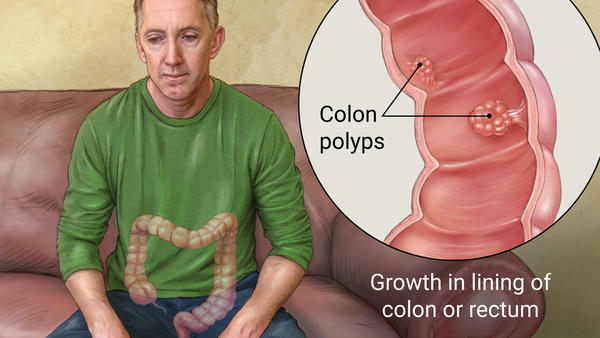
Colorectal polyps are commonly found during standard screening exams of the colon (large intestine) and rectum (the bottom section of your colon). They affect about 20% to 30% of American adults. Polyps are abnormal growths that start in the inner lining of the colon or rectum. Some polyps are flat while others have a stalk.
Colorectal polyps can grow in any part of the colon. Most often, they grow in the left side of the colon and in the rectum. While the majority of polyps will not become cancer, certain types may be precancerous. Having polyps removed reduces a person’s future risk for colorectal cancer.
Most colorectal polyps do not cause any symptoms unless they are large. That is why screening for polyps and cancer is so important. While uncommon, polyps can cause these symptoms:
The most common test used to detect colorectal polyps is a colonoscopy. During this outpatient test, your colon and rectal surgeon will examine your colon using a long, thin flexible tube with a camera and a light on the end. If polyps are found, they are removed at the same time.
CT colonography (called virtual colonoscopy) may be used to examine the colon indirectly. However, If polyps or a tumor are found during this test, follow-up colonoscopy may be needed to remove or biopsy them. Other tests used to detect polyps include a digital rectal exam, fecal occult blood testing (this tests for microscopic or invisible blood in the stool), barium enema, and sigmoidoscopy, which uses a flexible tube to inspect the sigmoid colon.
Removal of colorectal polyps is advised because there is no test to determine if one will turn into cancer. Nearly all polyps can be removed or eliminated during a colonoscopy. Large polyps may require more than one treatment. Rarely, some patients may require surgery for complete removal.
Once a colorectal polyp is completely removed, it rarely comes back. However, at least 30% of patients will develop new polyps after removal. For this reason, your physician will advise follow-up testing to look for new polyps. This is usually done 3 to 5 years after polyp removal. Taking a daily aspirin or other non-steroidal anti-inflammatory drugs (NSAIDs) may reduce the risk of new polyps forming. If you had polyps removed, ask your physician if you should take this medication to help prevent them from coming back.